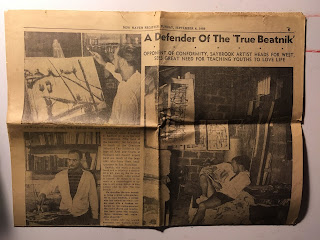Freddie (Endrich, Jr.) was my mother's most beloved first cousin. She adored him. He called her Maisie, and bought her daybooks every year, in which she faithfully recorded the weather, as well as whether or not my father or brother were at home.
When I was growing up, during the 1960's and 1970's, Freddie was the most gentle soul I knew. He sported a thin mustache above his ever-amused lips, and a beret. In 1959, our statewide paper called him a "beatnik" and reported on how he wished to conform with no one. Unlike the rest of the men in his German family, he spoke in a soft tenor. And he was educated: not only had he been to college (his father, a plumber, had a sixth grade education like most of our family from that generation) but he had been around the world, serving in Korea, teaching at the American University in Beirut for many years. He brought me home a copy of Aesop's Fables from that sojourn, a book I held, and will always hold, dear. The tortoise and the hare?! The lion and the mouse?!
We will, we will, rock you. - Freddie Mercury and Queen
Freddie loved my long, 1974, 13-year-old platinum hair. Somehow I had genetically mimicked the Swede who had adopted me, while with its length rebelling against parental authority all in a single act. Freddie took it as a sign of my Bohemian/artistic temperament. I was his, and he was mine.
I just gotta get out of this prison cell, one day I'm gonna be free: find me somebody to love.
Freddie had a former tenement house in the Lower East Side, south of Houston, which was a slum when I moved there in the mid-1980's. It's difficult now for people to envision NYC as it was then; so much dirt, so much crime, so much violence. The building in which Freddie lived with Basil and their twin dobermans and monkeys-in-the-shower recently sold for millions of dollars. It makes me laugh until I cry -- and I know it would him, too, if he were still around.
We are the champions, my friends. And we'll keep on fighting, 'til the end...
Freddie died of AIDS on February 12, 1988. He was 58 years old. He'd been gay for as long as any of us had known him, bringing his partner, Basil, to Christmas at my aunt's in New Jersey where he knew he'd be tolerated by a Catholic family focused on love. I couldn't find an obituary for him, and I am trying to locate his sculptures and papers in light of the recent death of his younger brother.
Freddie Mercury -- like my Freddie, a queer man who lived on the cusp of a transitioning society -- died of AIDS three years later, in 1991. There was no telling, in those days, who would die when. Some of those diagnosed died within weeks or months. Others are still here, amazingly and against the odds, to tell the tales. This year's Oscar-nominated film for Best Picture, Bohemian Rhapsody, tells Mercury's tale remarkably well, and re-plants the band's splendid glam-rock ear worms in our heads where, with luck, they live on as reminders to us all. The holocaust is not over, with more than a million people around the world dying of AIDS every year. And there is something about Bohemian Rhapsody, as a song, that always felt eerily prescient to me..."sends shivers down my spine/body's aching all the time...gonna leave you all behind..."
But life still goes on, I can't get used to living without you by my side. I don't want to live alone...I've got to break free.
I moved into the queer world of NYC in 1985, my partner Kathryn and I staying with Freddie and Basil on Eldridge Street and also at their cottage in Cherry Grove. We had stepped into a holocaust. Our pretty, smart, creative and beloved boys were dying every hour of every day of every week. Our lives were filled with visits to St. Vincent's and memorial services. But when my Freddie died, his illness was kept under wraps. I did not even get to visit him in the hospital. Suddenly, he was gone -- like so many others.
We cannot count the dead they are so many -- but we can remember them. I remember Freddie, his soft voice, his intellect, his laughter, his desire for pleasure and for joy, his sculptures made of neon light. Freddie wanted us all to be free. And we can continue our fight for a future in which the Freddie's do not die in their quest for pleasure and freedom.
These are our birthrights as humans, challenging to achieve though they are; and it is not god who punishes us in our quests for them. Long live our struggles for pleasure, and for freedom. Long live Freddie Endrich, and Freddie Mercury. I am so grateful to you both.
#ActUp. #FightBack. #Silence=Death.
Sunday, February 10, 2019
Remembering the Freddies, My Queens
Labels:
ActUP,
AIDS,
BohemianRhapsody,
Freddie,
FreddieMercury,
Queen,
Silence=Death
Subscribe to:
Post Comments (Atom)




No comments:
Post a Comment